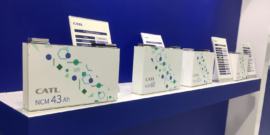On July 9, German prime minister Angela Merkel and Chinese Prime Minister Li Keqiang met to sign an agreement that will bring a CATL battery factory to the east German city of Erfurt. CATL, which stands for Contemporary Amperex Technology Ltd, is China’s largest battery manufacturer. BMW has already signed up to buy over $1.7 billion worth of batteries from CATL to power its upcoming electric cars for the European market — the electric MINI and an upcoming four door electric limousine. BMW will also purchase batteries worth nearly $3 billion from CATL for the electric vehicles it produces in China.
Volkswagen has said it plans to purchase $48 billion worth of batteries for its electric cars in the next few years. Its purchases will be split between CATL, Samsung SDI, and LG Chem, but how much of its business will go to each company is not known at this time. Daimler is also in the market for batteries for its EQ branded electric cars.
The major German automakers have all toyed with the idea of building their own battery factories in recent years and all have decided the process is too risky. Better to let others navigate the tricky waters of cobalt and lithium supply and stick to what they know best — building cars. Bosch, one of the largest suppliers to the German car industry, also considered building its own battery plant but thought better of it. That attitude doesn’t sit well with some Germans, who worry about being held captive to foreign interests as the market for electric cars ramps up in coming years.
Part of the problem is the constant drumbeat of news about major breakthroughs in battery technology coming soon. Building a battery factory costs beaucoup bucks. There is a chance that fancy new factory today could become an albatross around the neck of the owner tomorrow. The other argument is that car makers today don’t own oil companies, so why should they need to own battery manufacturers? People worry that car companies are becoming assemblers of parts — electric motors, battery management systems, and batteries — rather than real manufacturers.
The truth is, they transitioned to that role decades ago. The cars that roll off the assembly line today have seats, instrument panels, suspensions, tires, wheels, brakes, exhaust systems, and a bazillion other pieces that come from outside suppliers. As cars become more like smart phones, branding may become more important than who actually bolts everything together.
The new Jaguar I-PACE, for instance, is manufactured by Magna Steyr in Graz, Austria. But nobody cares, just so long as the Jaguar logo on the grille is the first thing they see. Magna also manufactures automobiles for several other high end car companies.
The car business is changing almost by the minute and battery manufacturing — which was minuscule just a decade ago — is growing into one of the world’s major industries. Some will thrive, some will get acquired by larger companies, and some will go out of business. The stakes are huge but it helps to have friends in high places.
China has shown a distinct preference for electric cars with batteries manufactured in China. A few years ago, Hyundai found itself locked out of the Chinese market after the government decided its cars with batteries manufactured in South Korea were no longer welcome in China. It soon switched to batteries made by CATL and suddenly everything was fine again. CATL has benefited greatly from direct and indirect assistance from the Chinese government, but it will have to fend for itself when it builds factories in other countries.
Source: Cleantechnica



